- Home
- Joanne Harris
Chocolat Page 3
Chocolat Read online
Page 3
I preached with greater severity than usual this morning, though the congregation was small. Tomorrow I’ll make them pay. Tomorrow, Sunday, when the shops are closed.
SIX
Saturday, February 15
School finished early today. By twelve the street was rampant with cowboys and Indians in bright anoraks and denim jeans, dragging their schoolbags — the older ones dragging on illicit cigarettes, with turned-up collars and half a nonchalant eye to the display window as they pass. I noticed one boy walking alone, very correct in grey overcoat and beret, his school cartable perfectly squared to his small shoulders. For a long moment he stared in at the window of La Celeste Praline, but the light was shining on the glass in such a way that I did not catch his expression. Then a group of four children of Anouk’s age stopped outside, and he moved on. Two noses snubbed briefly against the window, then the children retreated into a cluster as the four emptied pockets and pooled resources. A moment of hesitation as they decided who to send in. I pretended to be occupied with something behind the counter.
“Madame?” A small, smudgy face peered suspiciously up at me. I recognized the wolf from the Mardi Gras parade.
“Now, I have you down as a peanut brittle man.” I kept my face serious, for this purchase of sweets is serious business. “It’s good value, easy to share, doesn’t melt in your pockets and you can get”— I indicated with hands held apart — “oh, this much at least for five francs. Am I right?”
No answering smile, but a nod, as of one businessman to another. The coin was warm and a little sticky. He took the packet with care.
“I like the little gingerbread house,” he said gravely. “In the window.” In the doorway the three others nodded shyly, pressing together as if to give themselves courage. “It’s cool.” The American word was uttered with a kind of defiance, like smoke from a secret cigarette. I smiled.
“Very cool,” I agreed. “If you like, you and your friends can come over and help me eat it where I take it down.”
Eyes widened.
“Cool!”
“Hypercool”
“When?”
I shrugged. “I’ll tell Anouk to remind you,” I told them. “That’s my little girl.”
“We know. We saw her. She doesn’t go to school.” This last was uttered with some envy..
“She will on Monday. It’s a pity she doesn’t have any friends yet, because I told her she could ask them over. You know, to help me with the displays.” Feet shuffled, sticky hands held out, shoving and pushing to be first in line.
“We can”
“I can—”
“I’m Jeannot ”
“Claudine—”
“Lucie.”
I sent them out with a sugar mouse each and watched them fan across the square like dandelion seeds in the wind. A slice of sunlight glanced off their backs one after the other as they ran — red-orange-green-blue — then they were gone. From the shaded arch of St Jeromes I saw the priest, Francis Reynaud, watching them with a look of curiosity and, I thought, disapproval. I felt a moment’s surprise. Why should he disapprove? Since his duty visit on our first day he has not called again, though I have heard of him often from other people. Guillaume speaks of him with respect, Narcisse with temper, Caroline with that archness which I sense she adopts when speaking of any man under fifty. There is little warmth in their speech. He is not a local, I understand. A Paris seminarian, all his learning from books he does not know the land, its needs, its demands. This from Narcisse, who has had a running feud with the priest ever since he refused to attend Mass during the harvesting season. A man who does not suffer fools, says Guillaume, with that small gleam of humour from behind his round spectacles, that is to say so many of us, with our foolish little habits and our unbreakable routines. He pats Charly’s head affectionately as he says it, and the dog gives his single, solemn bark.
“He thinks it’s ridiculous to be so devoted to a dog,” said Guillaume ruefully. “He’s far too polite to say so, but he thinks it’s inappropriate. A man of my age…” Before his retirement Guillaume was a master at the local school. There are only two teachers there now to deal with the falling numbers, though many of the older people still refer to Guillaume as le maitre d’ecole. I watch as he scratches Charly gently behind the ears, and I am sure I sense the sadness I saw in him at the carnival; a furtive look which is almost guilt.
“A man of any age can choose his friends where he likes,” I interrupted with some heat. “Perhaps monsieur le cure could learn a few things from Charly himself.” Again that sweet, sad almost-smile.
“Monsieur le cure tries his best,” he told me gently. “We should not expect more.”
I did not answer. In my profession it is a truth quickly learned that the process of giving is without limits. Guillaume left La Praline with a small bag of florentines in his pocket; before he had turned the comer of Avenue des Francs Bourgeois I saw him stoop to offer one to the dog. A pat, a bark, a wagging of the short stubby tail. As I said, some people never have to think about giving.
The village is less strange to me now. Its inhabitants too. I am beginning to know faces, names; the first secret skeins of histories twisting together to form the umbilical which will eventually bind us. It is a more complex place than its geography at first suggests, the Rue Principale forking off into a hand-shaped branch of laterals — Rue des Poetes, Avenue des Francs Bourgeois, Ruelle des Freres de la Revolution — someone amongst the town planners had a fierce republican streak: My own square, Place Saint-Jerome, is the culmination of these reaching fingers, the church standing white and proud in an oblong of linden trees, the square of red shingle where the old men play petanque on fine evenings: Behind it, the hill falls away sharply towards that region of narrow streets collectively called Les Marauds.
This is Lansquenet’s tiny slum, close half-timbered houses staggering down the uneven cobbles towards the Tannes. Even there it is some distance before the houses give way to marshland; some are built on the river itself on platforms of rotting wood, dozens flank the stone embankment, long fingers of damp reaching towards their small high windows from the sluggish water. In a town like Agen, Les Marauds would attract tourists for its quaintness and rustic decay. But here there are no tourists. The people of Les Marauds are scavengers, living from what they can reclaim from the river. Many of their houses are derelict; elder trees grow from the sagging walls. I closed La Praline for two hours at lunch and Anouk and I went walking down towards the river. A couple of skinny children dabbled in the green mud by the waterside; even in February there was a mellow stink of sewage and rot. It was cold but sunny, and Anouk was wearing her red woollen coat and hat, racing along the stones and shouting to Pantoufle scampering in her wake. I have become so accustomed to Pantouffe — and to the rest of the strange menagerie which she trails in her bright wake — that at such times I can almost see him clearly; Pantoufle with his grey-whiskered face and wise eyes, the world suddenly brightening as if by a strange transference I have become Anouk, seeing with her eyes, following where she travels. At such times I feel I could die for love of her, my little stranger; my heart swelling dangerously so that the only release is to run too, my red coat flapping around my shoulders like wings, my hair a comet’s tail in the patchy blue sky.
A black cat crossed my path and I stopped to dance around it widdershins and to sing the rhyme:
Ou va-t-i, mistigri?
Passe sans faire de mal ici.
Anouk joined in and the cat purred, rolling over into the dust to be stroked. I bent down and saw a tiny old woman watching me curiously from the angle of a house. Black skirt, black coat, grey hair coiled and plaited into a neat, complex bun. Her eyes were sharp and black as a bird’s. I nodded to her.
“You’re from the chocolaterie,” she said. Despite her age which I took to be eighty, maybe more — her voice was brisk and strongly accented with the rough lilt of the Midi.
“Yes, I am.”
I
gave my name.
“Armande Voizin,” she said. “That’s my house over there.” She nodded towards one of the river-houses, this one in better repair than the rest, freshly whitewashed and with scarlet geraniums in the window boxes. Then, with a smile which worked her apple-doll face into a million wrinkles, she said, “I’ve seen your shop. Pretty enough, I’ll grant you that, but no good to folks like us. Much too fancy.” There was no disapproval in her voice as she spoke, but a half laughing fatalism.
“I hear our m’sieur le cure already has it in for you,” she added maliciously. “I suppose he thinks a chocolate shop is inappropriate in his square.”
She gave me another of those quizzical, mocking glances. “Does he know you’re a witch?” she asked.
Witch, witch. It’s the wrong word, but I knew what she meant.
“What makes you think that?”
“Oh, it’s obvious. Takes one to know one, I expect,” and she laughed, a sound like violins gone wild. “M’sieur le Cure doesn’t believe in magic,” she said. “Tell you the truth, I wouldn’t be so sure he even believes in God.” There was indulgent contempt in her voice. “He has a lot to learn, that man, even if he has got a degree in theology. And my silly daughter too. You don’t get degrees in life, do you?” I agreed that you didn’t, and enquired whether I knew her daughter.
“I expect so. Caro Clairmont. The most empty-headed piece of foolishness in all of Lansquenet. Talk, talk, talk, and not a particle of sense.”
She saw my smile and nodded cheerily. “Don’t worry, dear, at my age nothing much ends me any more. And she takes after her father, you know. That’s a great consolation.”
She looked at me quizzically. “You don’t get much entertainment around here,” she observed. “Especially if you’re old.”
She paused and peered at me again. “But with you I think maybe we’re in for a ‘ little amusement.”
Her hand brushed mine like a cool breath. I tried to catch her thoughts, to see if she was making fun of me, but ail I felt was humour and kindness.
“It’s only a chocolate shop,” I said with a smile.
Armande Voizin chuckled. “You really must think I was born yesterday,” she observed.
“Really, Madame Voizin—”
“Call me Armande.”
The black eyes snapped with amusement. “It makes me feel young.”
“All right. But I really don’t see why—”
“I know what wind you blew in on,” said Armande keenly. “I felt it. Mardi Gras, carnival day. Les Marauds was full of carnival people; gypsies, Spaniards, tinkers, pieds-noirs and undesirables. I knew you at once, you and your little girl what are you calling yourselves this time?”
“Vianne Rocher.” I smiled. “And this is Anouk.”
“Anouk,” repeated Armande softly. “And the little grey friend — my eyes aren’t as good as they used to be — what is it? A cat? A squirrel?”
Anouk shook her curly head. “He’s a rabbit,” she said with cheery scorn. “Called Pantoufle.”
“Oh, a rabbit. Of course.” Armande gave me a sly wink. “You see, I know what wind you blew in on. I’ve felt it myself once or twice. I may be old, but no-one can pull the wool over my eyes. No-one at all.”
I nodded. “Maybe that’s true,” I said. “Come over to La Praline one day; I know everyone’s favourite. I’ll treat you to a big box of yours.”
Armande laughed. “Oh, I’m not allowed chocolate. Caro and that idiot doctor won’t allow it. Or anything else I might enjoy,” she added wryly. “First smoking, then alcohol, now this…God knows, if I gave up breathing perhaps I might live for ever.”
She gave a snort of laughter, but it had a tired sound, and I saw her raise a hand to her chest in a clutching gesture eerily reminiscent of Josephine Muscat. “I’m not blaming them, exactly,” she said. “It’s just their way. Protection — from everything. From life. From death.” She gave a grin which was suddenly very gamine in spite of the wrinkles.
“I might call in to see you anyway,” she said. “If only to annoy the cure.”
I pondered her last remark for some time after she disappeared behind the angle of the whitewashed house. Some distance away Anouk was throwing stones onto the mud flats at the riverbank.
The cure. It seemed his name was never far from the lip’s. For a moment I considered Francis Reynaud.
In a place like Lansquenet it sometimes happens that one person — schoolteacher, cafe proprietor, or priest forms the lynchpin of the community. That this single individual is the essential core of the machinery which turns lives, like the central pin of a clock mechanism, sending wheels to turn wheels, hammers to strike, needles to point the hour. If the pin slips or is damaged, the clock stops. Lansquenet is like that clock, needles perpetually frozen at a minute to midnight, wheels and cogs turning uselessly behind the bland blank face. Set a church clock wrong to fool the devil, my mother always told me. But in this case I suspect the devil is not fooled. Not for a minute.
SEVEN
Sunday, February 16
MY MOTHER WAS A WITCH. AT LEAST, THAT’S WHAT SHE called herself, falling so many times into the game of believing herself that at the end there was no telling fake from fact. Armande Voizin reminds me of her in some ways; the bright, wicked eyes, the long hair which must have been glossy black in her youth, the- blend of wistfulness and cynicism. From her I learned what shaped me. The art of turning bad luck into good. The forking of the fingers to divert the path of malchance. The sewing of a sachet, brewing of a draught, the conviction that a spider brings good luck before midnight and bad luck after. Most of all she gave me her love of new places, the gypsy wanderlust which took us all over Europe and further; a year in Budapest, another in Prague, six months in Rome, four in Athens, then across the Alps to Monaco, along the coast, Cannes, Marseille, Barcelona…By my eighteenth year I had lost count of the cities in which we had lived, the languages we had spoken. Jobs were as varied; waitressing, interpreting, car repair. Sometimes we escaped from the windows of cheap overnight hotels without paying the bill. We rode trains without tickets, forged work permits, crossed borders illicitly. We were deported countless times. Twice my mother was arrested, but released without charge. Our names changed as we moved, drifting from one regional variant to another; Yanne, Jeanne, Johanne, Giovanna, Anne, Anouchka. Like thieves we were perpetually on the run, converting the unwieldy ballast of life into francs, pounds, kroner, dollars, as we fled where the wind took us. Don’t think I suffered; life was a fine adventure for those years. We had each other, my mother and I. I never felt the need for a father. My friends were countless. And yet it must have preyed upon her sometimes, the lack of permanence, the need always to contrive. Still we raced faster as the years wore on, staying a month, two at the most, then moving on like fugitives racing the sunset. It took me some years to understand that it was death we fled.
She was forty. It was cancer. She’d known for some time, she told me, but recently…No, there was to be no hospital. No hospital, did I understand? There were months, years left in her and she wanted to see America: New York, the Florida Everglades. We were moving almost every day now, Mother reading the cards at night when she thought I was asleep. We boarded a cruiser from Lisbon, both of us working in the kitchens. Finishing at two or three every morning, we rose at dawn. Every night the cards, slippery to the touch with age and respectful handling, were laid out on the bunk beside her. She whispered their names to herself, sinking deeper every day into the mazy confusion which would eventually claim her altogether.
Ten of Swords, death. Three of Swords, death. Two of Swords, death. The Chariot. Death.
The Chariot turned out to be a New York cab one summer evening as we shopped for groceries in the busy Chinatown streets. It was better than cancer, in any case.
When my daughter was born nine months later I called her after both of us. It seemed appropriate. Her father never knew her — nor am I sure which one he was in the wilting
daisy-chain of my brief encounters. It doesn’t matter. I could have peeled an apple at midnight and thrown the rind over my shoulder to know his initial, but I never cared enough to do it. Too much ballast slows us down.
And yet…Since I left New York, haven’t the winds blown less hard, less often? Hasn’t there been a kind of wrench every time we leave a place, a kind of regret? I think there has. Twenty-five years, and at last the spring has begun to grow tired, just as my mother grew tired in the final years. I find myself looking at the sun and wondering what it would be like to see it rise above the same horizon for five — maybe ten, maybe twenty — years: The thought fills me with a strange dizziness, a feeling of fear and longing. And Anouk, my little stranger? I see the brave adventure we lived for so long in a different light now that I am the mother. I see myself as I was, the brown girl with the long uncombed hair, wearing cast-off charity-shop clothing, learning maths the hard way, geography the hard way. How much bread for two francs? How far will a fifty-mark rail ticket take us? — and I do not want it for her. Perhaps this is why we have stayed in France for the last five years. For the first time in my life, I have a bank account. I have a trade.
My mother would have despised all this. And yet perhaps she would have envied me too. Forget yourself if you can, she would have told me. Forget who you are. For as long as you am bear it. But one day, my girl, one day it will catch you. I know.
I opened as usual today. For the morning only — I’11 allow myself a half-day with Anouk this afternoon — but it’s Mass this morning and there will be people in the square. February has reasserted its drab self and now it is raining; a freezing, gritty rain which slicks the paving and colours the sky the shade of old pewter. Anouk reads a book of nursery rhymes behind the counter and keeps an eye on the door for me as I prepare a batch of mendiants in the kitchen. These are my own favourites — thus named because they were sold by beggars and gypsies years ago biscuit-sized discs of dark, milk or white chocolate upon which have been scattered lemon-rind, almonds and plump Malaga raisins. Anouk likes the white ones, though I prefer the dark, made with the finest 70 per cent couverture…Bitter-smooth on the tongue with the taste of the secret tropics. My mother would have despised this, too. And yet this is also a kind of magic.

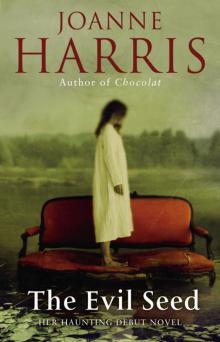 The Evil Seed
The Evil Seed Gentlemen and Players
Gentlemen and Players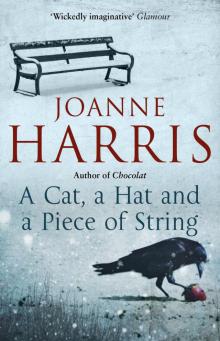 A Cat, a Hat, and a Piece of String
A Cat, a Hat, and a Piece of String Different Class
Different Class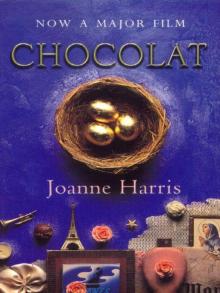 Chocolat
Chocolat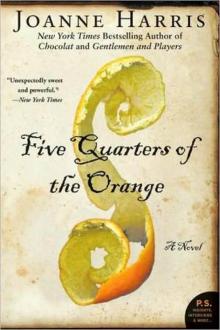 Five Quarters of the Orange: A Novel
Five Quarters of the Orange: A Novel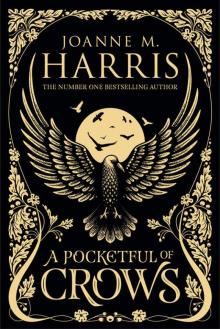 A Pocketful of Crows
A Pocketful of Crows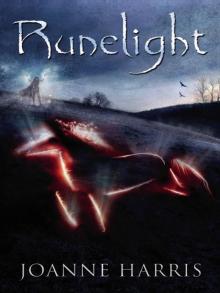 Runelight
Runelight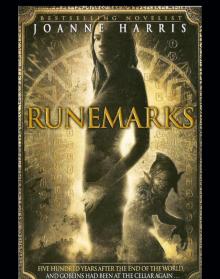 Runemarks
Runemarks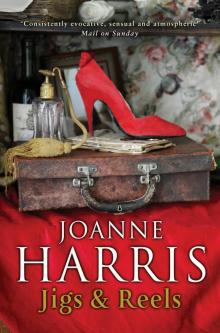 Jigs & Reels: Stories
Jigs & Reels: Stories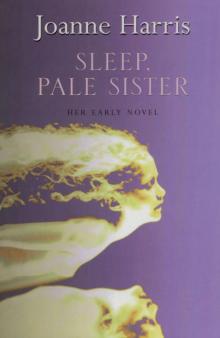 Sleep, Pale Sister
Sleep, Pale Sister Holy Fools
Holy Fools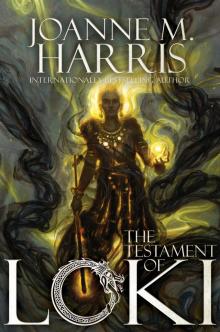 The Testament of Loki
The Testament of Loki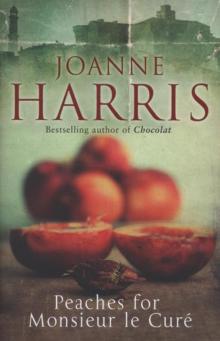 Peaches for Monsieur Le Curé
Peaches for Monsieur Le Curé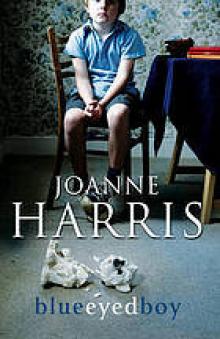 Blueeyedboy
Blueeyedboy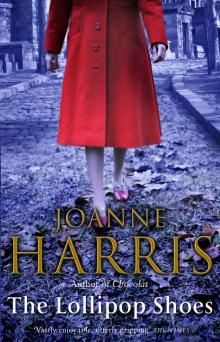 The Lollipop Shoes
The Lollipop Shoes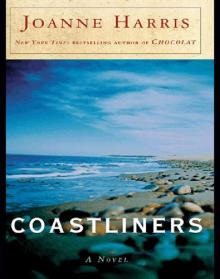 Coastliners
Coastliners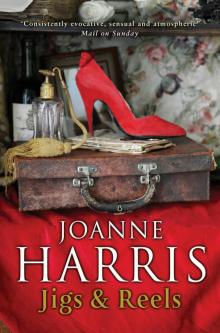 Jigs & Reels
Jigs & Reels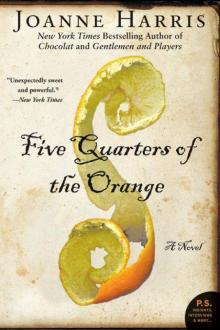 Five Quarters of the Orange
Five Quarters of the Orange